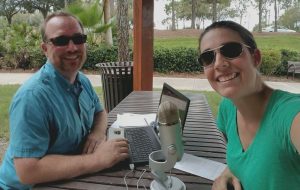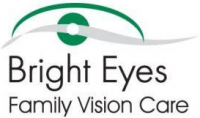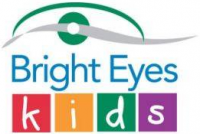Welcome to The Bright Eyes Podcast: Advice for Healthy Vision for All Ages. Your hosts are Dr. Nate Bonilla-Warford & Dr. Beth Knighton, residency-trained optometrist that provide eye exams for glasses and contacts, and specialty services including vision therapy, myopia control, orthokeratology, and sports vision training. Their mission to empower patients by providing the best in friendly, professional, and individualized eye care.
In this episode, Dr. Beth and Dr. Nate go outside to discuss ultraviolet light and the importance of UV protection for the eyes.
Transcript:
Dr. Beth: From Bay Bridge Park in Tampa Bay Florida and this is The Bright Eyes podcast. This is episode number 4. I am Dr. Beth Knighton.
Dr. Nate: And I am Dr. Nate Bonilla-Warford.
Dr. Beth: And today's episode is all about sunlight and UV protection.
Dr. Nate: That is right in so we are at one of our favorite parks near the Bright Eyes Family office as you might be able to tell by the children in the background. DO you come here with your family, Beth?
Dr. Beth: Yeah, all the time. My 2 year old loves this place.
Dr. Nate: The only thing I know about this part is that there's lots of PokeStops here.
Dr. Beth: It's great to get out to the park with our family is so there's lots of benefits of being outside - most of all being active. But it's also great being with our families, whether it's biking or camping or whatnot. But the thing that we want to stress today is the importance of UV protection while we are outside. When we're outside were getting bombarded with all this UV light from the sun and for the same reasons we wear sunscreen on our skin to protect our skin we should be also protecting our eyes
Dr. Nate: So we have a lot of patients that moved here from different parts of the country or even different parts of the world and not everybody knows this. But Florida is the Sunshine State. There's a lot of sunshine in Florida and while that's lovely and most people do move here specifically for that reason we also do you have to protect ourselves. One of the first things that you can choose to do is trying not to go outside during the absolute highest amount of UV times that that's usually from about 10 A. M. to maybe 2 or 3 in the afternoon.
Dr. Beth: It always amuses me when the meteorologists talks about the UV index rather weak because here in Florida it's basically a 9 everyday the whole summer and our summer is really March to September so it's always a 9 here ... so we are constantly thinking about the UV protection that we need ... but not so much unnecessarily. From other parts of the U. S. When we talk about sunglasses it's important that we're not only looking at how dark the changes as far as the comfort of how our eyes feel outside but that it actually has UV protection in the lens. You want to look for sunglasses that have UV A and UV B protection and the lenses that helps protect you from the most harmful parts of the sunlight.
Dr. Nate: And not only do you want sunglasses that have both right section but ideally you want sunglasses like the ones that we have on right now that have a little curvature to them so they limit light coming in from the sides that it not only protects your eyes eyeball itself but also the eyelids and so that they should look good they should feel good but most importantly they should provide lots of coverage. And you can supplement that with a hat or a visor to protect from the directs sun overhead as much as possible. So Beth is the sunlight a short term, a long term issue, or can it be both?

Dr. Nate and Dr. Beth protecting their eyes from UV light
Dr. Beth: Absolutely both so there are short term effects on the eyes so say you're going out on the boat with their family and you're gonna go water skiing so you're not wearing your sunglasses you can actually get the equivalent of a sunburn on the front surface of your eye from all the exposure to the light ... throughout the day so that's a short term kind of consequence of the sunlight but then also we have the long term buildup of all this UV damage over time which is exactly why all of our dermatologists in primary care doctors tell us to wear sunscreen and make up with sunscreen and lotions with sunscreen on a daily basis to protect our skin and certainly sunglasses help to prevent those same kind of skin cancers from the eyelids and the surface are round eyes. But also we want to protect the inside parts of our eyes from that long term build up of UV damage the things that that long term UV damage can cause include cataracts or macular degeneration which both can have a impact on how well you can see we want you to be able to see along into your nineties and perhaps beyond and so wearing sunglasses even as a child or young adult really is setting the groundwork for keeping that vision healthy throughout your life.
Dr. Nate: And if you wanted one more reason to protect your eyes from ultraviolet light, it might not cause pain or it might not because I disease but Dr. Knighton and I every day when we look under the microscope people's eyes we can see the sun damage that occurs on the white parts of people's eyes called the sclera. People often ask us where can I do to get rid of that and the best answer is to prevent that change from happening in the first place and the way you do that is to protect your eyes with sunglasses, with hats, with using caution when you're outside when it's very, very bright.
Dr. Beth: Another really cool advancement and I care is that a lot of the contact lenses also include some UV protection being built right into the contact lens and so that's been really fantastic that companies have been integrating into the contacts in order to promote healthy vision.
Dr. Beth: One thing that I get asked a lot is what's the difference between UV protection on my sunglasses and polarization and my sunglasses. The UV protection is that healthy part. That's the part that blocks out the harms full rays of light to keep your eyes healthy. The polarization is a filter in the sunglasses that helps. to sharpen the vision to kind of give you that HD vision but polarization on its own does not protect you from the harmful light rays so ideally you have sunglasses that have both. But certainly the UV protection is the important part.
Dr. Nate: That is right and that is what we tell patients all day everyday.
Dr. Beth: Well, thank you for listening if you have any questions comments or suggestions you can email us at office@brighteyestampa.com. Until next time.....
Links:
- Weather Network's UV Indicator for Tampa Bay
- American Optometric Association Page on UV Protection
- CNN's story on Anderson Cooper's eye sunburn.
Thank you for listening. If you have questions, comments, or suggestions, you can email us at office@brighteyestampa.com.
The only purpose of this podcast is to educate and to inform. It is no substitute for professional care by a doctor experienced in the area you require. This podcast is provided on the understanding that it does not constitute medical or other professional advice or services. Please consult your physician for diagnosis and treatment.
Intro/outro music: Lucas Warford of Three For Silver.



Leave a Reply